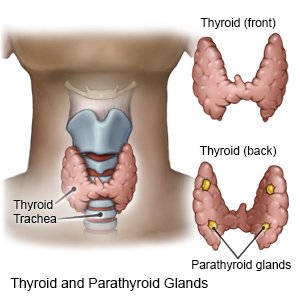Thyroid Ablation
Medically reviewed by Drugs.com. Last updated on Apr 6, 2025.
Thyroid ablation is a procedure to decrease the function of some or all of your thyroid gland. Your thyroid makes hormones that help control your body temperature, heart rate, and growth. The hormones also control how fast your body uses food for energy.
 |
DISCHARGE INSTRUCTIONS:
Call your local emergency number (911 in the US) for any of the following:
- You have sudden trouble breathing.
- You have any of the following signs of a stroke:
- Numbness or drooping on one side of your face
- Weakness in an arm or leg
- Confusion or difficulty speaking
- Dizziness, a severe headache, or vision loss
Seek care immediately if:
- You have worsening pain and swelling in your face or neck.
- You have not had a bowel movement for more than 1 day.
- You are not urinating.
Call your doctor or endocrinologist if:
- You have new or increased fatigue.
- You have a fever or chills.
- You have a white covering on your tongue.
- You have increased nausea or are vomiting.
- Your heartbeat is more than 100 beats per minute.
- You have questions or concerns about your procedure or care.
Medicines:
- Antinausea medicine may be given to calm your stomach and to stop you from vomiting.
- Laxatives may be given to help you have a bowel movement. Bowel movements will help decrease the amount of radiation in your body. You need to have at least 1 bowel movement daily for several days after your procedure.
- Thyroid hormone is given to keep your thyroid hormone level normal.
- Take your medicine as directed. Contact your healthcare provider if you think your medicine is not helping or if you have side effects. Tell your provider if you are allergic to any medicine. Keep a list of the medicines, vitamins, and herbs you take. Include the amounts, and when and why you take them. Bring the list or the pill bottles to follow-up visits. Carry your medicine list with you in case of an emergency.
Drugs used to treat this and similar conditions
ThyroShield
ThyroShield is used for cough, cutaneous sporotrichosis, hyperthyroidism, radiation emergency
Omvoh
Omvoh is used to treat moderate to severe ulcerative colitis or Crohn's disease in adults. This ...
Hicon
Hicon is used for diagnosis and investigation, hyperthyroidism, thyroid cancer
Sodium iodide-i-131
Sodium iodide-i-131 systemic is used for diagnosis and investigation, hyperthyroidism, thyroid cancer
Iodine/potassium iodide
Iodine/potassium iodide systemic is used for hyperthyroidism
Potassium iodide
Potassium iodide systemic is used for cough, cutaneous sporotrichosis, hyperthyroidism, radiation ...
Radiation safety:
Do the following for as long as directed:
- Stay 6 to 7 feet away from others to prevent exposing them to the radiation inside you.
- Sleep in a different room than your partner for 2 to 3 days after your procedure or as directed.
- Drink more liquid so you do not become dehydrated. Adults should drink about 9 to 13 cups of liquid each day. One cup is 8 ounces.
- Flush your toilet 2 to 3 times after you go urinate or have a bowel movement.
- Wash your hands often and rinse the sink afterward.

- Wash your clothes and dishes separately from clothes and dishes of others.
Mouth care:
Keep your mouth clean to help prevent infection. Use fluoride toothpaste and a medicated mouthwash as directed. Increased saliva may also help decrease your risk for infection. Sour candy, lemon juice, and chewing gum can be used to increase your saliva. You can also massage your jaw area to make more saliva.
For women who plan to become pregnant or breastfeed:
You may need to wait 6 to 12 months before you get pregnant after thyroid ablation. You may also need to stop breastfeeding for a period of time. Radiation can be passed to your child through breast milk. Talk with your healthcare provider about pregnancy and breastfeeding after your procedure.
Travel:
You may need a letter from your healthcare provider if you plan to fly on a plane. The radiation from your thyroid ablation may cause security alarms to go off in the airport. The letter will explain the procedure you had and why security may find radiation in your body.
Do not smoke:
If you smoke, it is never too late to quit. Smoking increases your risk for problems after your thyroid ablation. Smoking also harms the heart and lungs. You are more likely to have a heart attack, lung disease, or cancer if you smoke. Ask for more information about how to stop smoking if you are having trouble quitting.
Follow up with your doctor or endocrinologist as directed:
You may need tests such as an ultrasound to check for returning thyroid disease. You may need a whole body scan to check for any remaining radioactive iodine in your body. This may be done 1 week after your procedure, and again in 6 to 12 months. Keep all appointments. Write down your questions so you remember to ask them during your visits.
© Copyright Merative 2025 Information is for End User's use only and may not be sold, redistributed or otherwise used for commercial purposes.
The above information is an educational aid only. It is not intended as medical advice for individual conditions or treatments. Talk to your doctor, nurse or pharmacist before following any medical regimen to see if it is safe and effective for you.
Further information
Always consult your healthcare provider to ensure the information displayed on this page applies to your personal circumstances.
